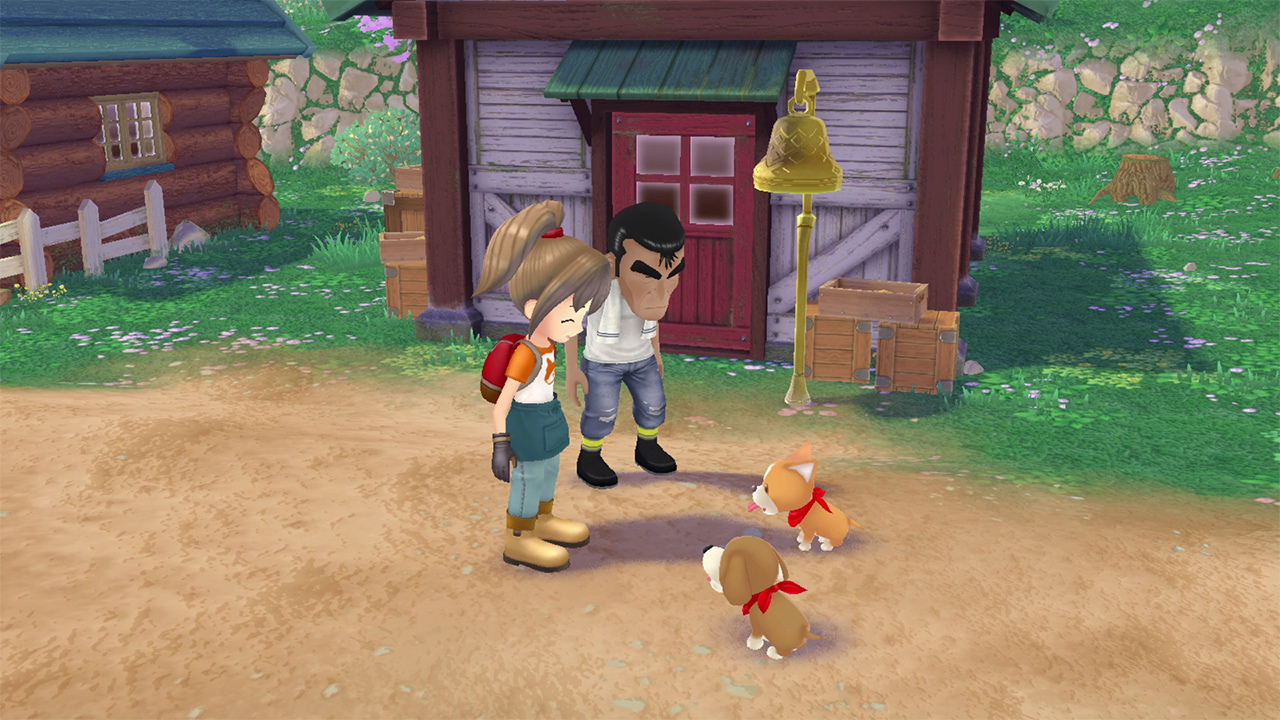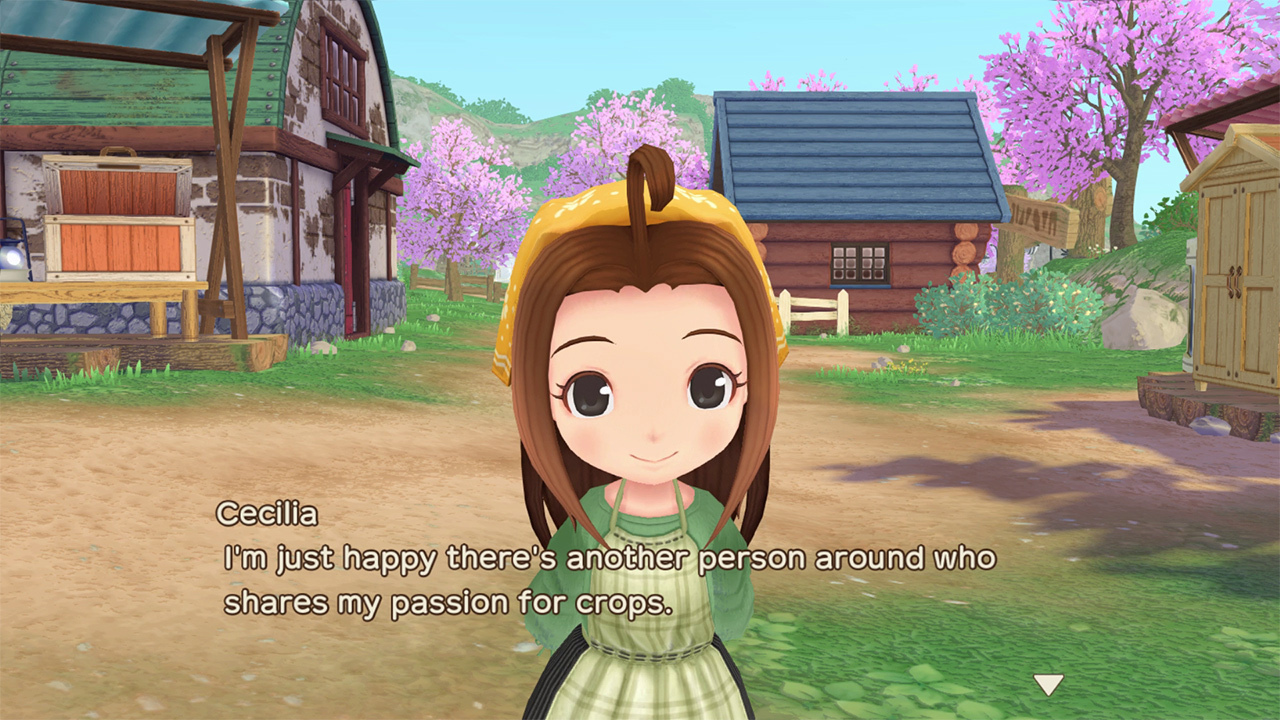Much like an axe, sickle, or hoe, nostalgia is a powerful tool. In Story of Seasons: A Wonderful Life, it's what leads your farmer to return to Forgotten Valley in hopes of creating a life similar to the idyllic one led by their parents. It's also what led me--clad in my finest, rose-tinted glasses--to revisit A Wonderful Life with its recent remake. As I downloaded this new version of a game I once sunk several hours into for my Nintendo Switch, I reminisced about the first time I played the game two decades ago--the feel of my grandparents' itchy carpet, the satisfying "click" of my purple GameCube closing before it kicked into a soft whir... It was never my favorite Harvest Moon game--that spot was reserved for Back to Nature--but it was one that I found unique and enjoyable.
In some ways, I also feel that way about its 2023 remake. Story of Seasons: A Wonderful Life is a very different type of farming simulator in that it's one that focuses more on relationships, family, and legacy than farm work. It's a concept I can get behind, and A Wonderful Life's emphasis on streamlining gameplay and eliminating tedium is a breath of fresh air. However, despite social-sim dynamics being at the forefront of A Wonderful Life, player interactions and the community itself feel shallow. Although the character creation process might be more involved than ever, few NPCs are memorable, dialogue is scarce, and the game's idyllic setting turns eerie quickly due to the town's vacant atmosphere. Yet if I factor out this less-than-wonderful content, not all that much is left, making A Wonderful Life feel dated and empty--especially when compared to other games in the now-highly saturated farming game genre.

Like most farming sims, A Wonderful Life begins with a letter--only this time it's sent from your character rather than to you. After growing tired of life in the city, your character pens a letter to your parents' former friend, Takakura, informing him of your intention to come to Forgotten Valley and take over your parents' old farm. Upon your arrival, Takakura offers your farmer a cow, a decent sum of money, and a tutorial that beautifully walks the fine line between overbearing and uninformative, before giving you total control over your character and farm.
This tutorial--and how easy these notes are to access at all times--comes in clutch due to how dramatically different A Wonderful Life is from other farming sims. Whereas games like Stardew Valley and the vast majority of Harvest Moon and Story of Seasons games give you a large, dilapidated field, your A Wonderful Life farm starts in a neat and tidy state with only two small plots of land--one with poor soil quality and one with average quality, a factor which frequently comes into play. The bulk of your farm is a fenced-off field your livestock can graze upon, which quickly informs you that animal husbandry should be your focus and is the biggest money-maker; this is a dramatically different approach to farming sims, which generally rely on crops to get your cash flowing. Ultimately, these qualities actually make A Wonderful Life a great farming sim for genre newcomers to get into--there's less to manage, less to do, and a lot less to worry about.
However, for those more familiar with the genre this is only the beginning of the long list of differences. For example, you cannot ship any items you forage or gather in A Wonderful Life--that bin is reserved solely for items you harvest. Instead, you must wait until the traveling salesman Van comes to town or set up your own stall in the center of town, in hopes that your wandering neighbors will see your booth and slowly venture over. Furthermore, a year in A Wonderful Life is only 40 days long, with each season representing 10 of those days and containing one holiday. This means time goes by quickly and tasks that you would generally do daily--such as watering your plants and milking your cow--can and should be done twice a day in this game. This also gives the game the room it needs to span several years, giving players the wonderful opportunity to watch their community change and their future child grow.
And while there are a handful of things you can upgrade on your farm and in your inventory, there's zero resource collecting and attaining these upgrades doesn't feel like much of a focus. In fact, rather than having any sort of farming or financial goals, the game emphasizes that you must get married in your first year of living in Forgotten Valley--or else the game will end.

This is where you start to experience some friction. While a streamlined farm and shortened calendar sounds great in theory, its execution in A Wonderful Life leaves a lot to be desired. Outside of tending to your farm and picking random herbs and flowers, there are essentially five things you can do: Visit the city, visit the Harvest Sprites to grab a recipe, socialize with your neighbors, mine, and fish. That sounds like a decent amount, right? Here's the problem: Each one of these activities is incredibly shallow and dull. To visit the city, you go to the outskirts of town, indicate that you are willing to spend six hours visiting the city, and then the screen goes black and you return six hours later. I am still not sure if it actually does anything.
Visiting the Harvest Sprites entails eating a mushroom, entering their home, and then talking to one of them to get a recipe. If you try talking to the other two, they'll just repeat that they don't have a recipe for you at this time. Mining consists of entering a tiny dig site--probably made up of 15 squares--being handed a shovel, and repeatedly digging at the same squares in an attempt to find fossils. And fishing sees you cast your line, wait for your bobber to sink, and then hold down a button. That is it.
However, socialization might be the most frustrating part. Seeing as I am told emphatically and frequently that I need to marry someone in order to live in Forgotten Valley, which of course feels strange in itself, getting to know someone is obviously a big priority. But there are a few problems with this: The folks you can marry are largely stationary and uninteresting, heart events are brief and not particularly gripping, and gifts and dialogue feel impersonal. While I am delighted developer Marvelous added same-sex marriage to the game, it doesn't make up for the fact that the candidates aren't the most lively group of people. I gravitated towards Matthew and Molly in my playthrough, as they exuded the most personality, but everyone else felt more or less one-note. While I ultimately married Matthew, the romance didn't feel engaging or earned. Though I enjoyed Matthew's Darcy-esque personality, it didn't feel as if we got to know one another, bonded, and fell in love. And maybe I'm just sappy, but that's a feeling I'm pretty fond of in any games with a romance element and would have preferred to experience instead of the forced situation we're offered.

Even in regards to friendship, the town is just… vacant. It's a word I keep coming back to, but one that aptly describes Forgotten Valley, a place where things like a general store, library, school, museum--any sort of lively and purposeful building, really--don't exist. Dialogue is often recycled, the townsfolk seldom interact with each other, and the town is more filled with strange scientists than people who feel like part of a tight-knit community. While there is this core of sentimentality here, you have to look extremely hard to see it--and that ultimately makes for a really isolating experience. Oh, you can also complete item requests for your neighbors, but it happens so infrequently, it's something I'm only just now remembering exists. To be quite honest, there were multiple days I went to bed before the sun had even set--there was nothing to do, no one to see, and standing by a river hitting a button to reel in a fish every 20 seconds just didn't sound super appealing.
Some things break up the monotony--holidays, events with your child, and watching them grow up (which is probably the coolest feature and makes the quick calendar worth it) are nice. The game's graphics and music are lovely enough, gameplay is significantly smoother than it was in the original, and its streamlined approach to farming and quality-of-life updates, such as adding NPC icons to your map so you don't have to look very hard to find people, are good features. Unfortunately, the entire package is just not enough.
Back in 2003, A Wonderful Life offered a refreshing and sentimental take on the farming sim genre. However, even then, it felt a bit empty when compared to what many other simulation games were doing. While Marvelous added greater inclusivity, clarity, and additional events and dialogue, it doesn't keep this 2023 remake from feeling empty and stuck in the past.